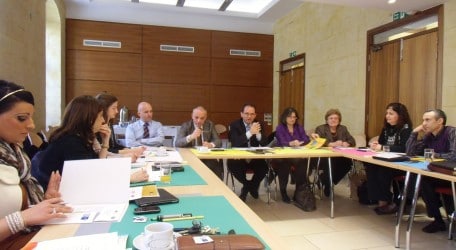
Volunteering is key to social and economic fabric of Maltese society.
There are an estimated 30,000 volunteers and over 500 registered voluntary organisations in Malta.
There are many more volunteers and community organisations playing a role in improving the quality of life of Maltese citizens.
Yesterday, 20 key stakeholders linked to the voluntary sector including the Minister of Justice, Dialogue and the Family, Hon. Chris Said and the EU Permanent Representative in Malta, Martin Bugelli, as well as representatives from government and non-governmental organisations involved in volunteering met at Dar L-Ewropa in Valletta to discuss the volunteering landscape in Malta and the launch of the European PAVE policy document.
The Policy Agenda for Volunteering in Europe (P.A.V.E) was developed in 2011 as part of the European Year of Volunteering 2011. P.A.V.E. has been endorsed by more than 30 EYV 2011 Alliance members and was presented to the European Commission in December 2011. The document provides recommendations for a more efficient and effective European Policy Framework to support and promote volunteers, volunteering, volunteer-involving organisations and their partners. National member states have been invited to discuss how these recommendations may be implemented at member state level to ensure an enabling environment for volunteers across Europe.
Minister Chris Said confirmed the importance of the development of a national framework for volunteering that both recognises the value of those already volunteering but also those ‘unrecognised volunteers’ who may be contributing to society as a volunteer without even realising it. EU Permanent Representative Martin Bugelli highlighted that volunteering is an integral part of the fabric of Maltese society and needs to be recognised as such, including its role in the economic development of the country.
Volunteering was recognised by all as a cross cutting issue and not just a tool for the achievement of social aims. Volunteering can and will play a role in achieving smart, sustainable and inclusive growth in Malta as part of the Europe 2020 strategy.
Participants recognised the validity of the PAVE recommendations for Malta and identified important steps to ensure that quality volunteering opportunities are available and more citizens are encouraged and enabled to volunteer.
In particular, it was recognised that social partners will play an important role in the future of volunteering in Malta, both in the adoption of employee volunteering schemes, but also in recognising the value of volunteering for the skills, expertise and professional development of existing and future employees. The importance of employers allowing flexibility for workers to partake in volunteering activities was highlighted as representing a possible key step forward for the creation of an enabling environment for volunteers.
A key message arising from the conference was that policies and procedures included in a national volunteering framework should enable quality volunteering opportunities and should recognise volunteering efforts and their value. Volunteering should take place facilitative infrastructure that will ensure the impact of volunteer efforts and their contribution to improving the quality of life of Maltese citizens.
The Malta Council for the Voluntary Sector along with SOS Malta and the stakeholders present are committed to taking the PAVE initiative forward to ensure a strong future for volunteering in Malta.
- March 30, 2012 No comments Posted in: Volunteers





